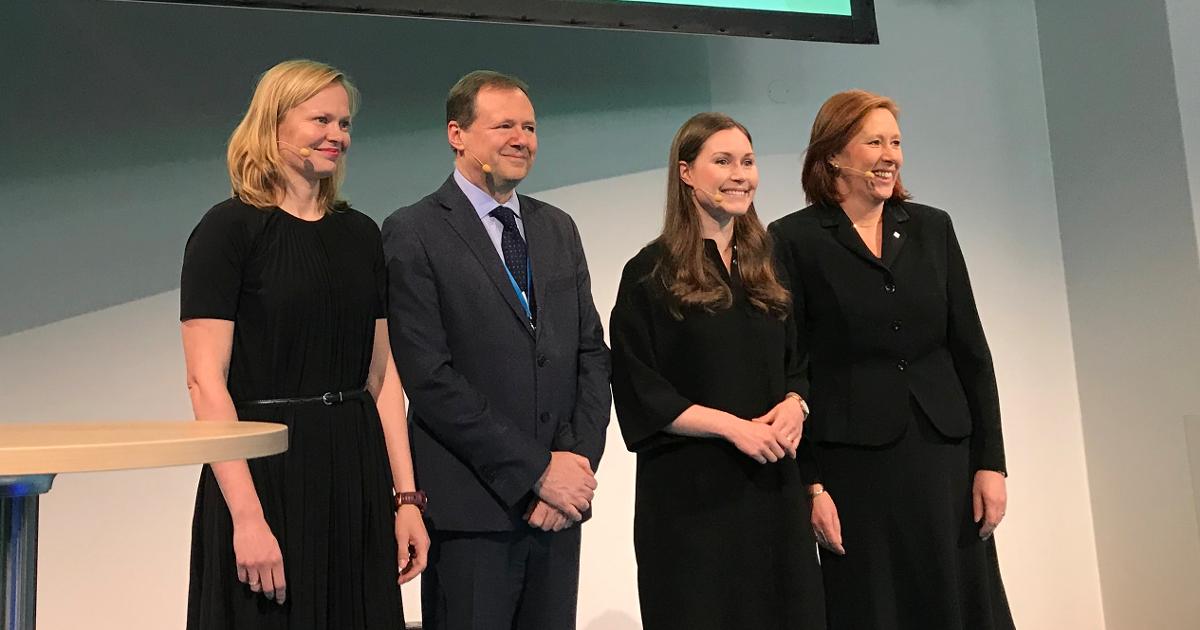Common rules will strengthen the development of data economy

Finland wants to strengthen the development of data economy and harmonise the development work across different sectors. The key aims for data economy both in Europe and globally are a human-centred approach and sustainability.
At a High-Level Conference on Data Economy held in Helsinki today, Minister of Transport and Communications Sanna Marin, Minister of Local Government and Ownership Steering Sirpa Paatero and Minister of Science and Culture Hanna Kosonen called on Europe to seize the opportunities offered by data economy.
At the conference, the Ministers also published the principles for European data economy, drawn up under the leadership of Finland. The principles aim to guide data economy to a human-centred, successful and balanced direction.
A wide array of representatives of EU countries, European companies, public authorities, research institutes and interest groups have participated in the drafting of the principles for data economy. The principles for data economy involve access to data, sharing of data, capabilities of individuals, innovation, trust and learning. The project has been open to all interested parties.
In addition, the Ministers and Director-General Roberto Viola from the European Commission's Directorate-General for Communications Networks, Contents and Technology (DG Connect), received a proposal by industry for codes of conduct on data portability. Such codes will facilitate the transfer of information between different service providers.
These codes of conduct are based on EU legislation on safeguarding the free movement of data within the Union. Facilitating the free movement of data is a key part of the digitalisation of the internal market.
"European values make for a solid foundation for a data economy that respects citizens' rights. Data must be processed in a human-centred manner, respecting the rights of individuals," says Minister of Transport and Communications Sanna Marin.
"The development of public administration is interlinked with the development of data economy. It is possible to make more efficient use of our information resources, for example in the development of services in the private and public sectors. With the help of information produced by public administration new business can be generated. In addition, the principles we have drawn up serve our objectives by, for example, assuring citizens that their fundamental rights will be safeguarded as the data economy develops," says Minister of Local Government and Ownership Steering Sirpa Paatero
"It is important that we promote the openness and reuse of data for the benefit of research, creative industries and society as a whole. The principles announced at the Conference will have a key impact on the development of the European data economy," says Minister of Science and Culture Hanna Kosonen.
"The European Commission welcomes these Codes of Conduct, which have been drawn up in response to the Free Flow of non-personal Data Regulation. It is important for us that both cloud service providers and users have worked together with the support of the Commission to reach agreement. The Codes must now be implemented quickly so that by 2022, as required by the Regulation, the Commission can evaluate their impact and, in particular, whether they have had the positive effect on the cloud market that was intended", says Roberto Viola, Director-General of DG Connect.
The High-Level Conference on Data Economy has been organised by the Ministry of Transport and Communications, the Ministry of Finance and the Ministry of Education and Culture. The event is part of the programme of Finland's Presidency of the Council of the European Union.
Guiding principles for an ethical data-driven society briefly
Access
Access by default. Access to data according to various access rights (e.g. business-to-business, business-to-government) should be facilitated by technical or legal solutions and support.
Share
Reusable by default. Data sets need to be interoperable and harmonised in a structured format to enable the flow of data in automated processes.
Act
Human-centric by default. Individuals are guaranteed access to their personal data and the means to manage the reuse of their data without lock-ins or impediments that inhibit access or portability (e.g. timeliness).
Trust
Ethically sustainable by default. Building trust in data use and data-driven technologies requires strong respect for human rights, and transparency, reliability and the inclusion of all stakeholders. Data security and privacy by design should be integral parts of business and service development practices.
Innovate
Level-playing field by default. Data market access should be open to all on a fair and non-discriminatory basis for the benefit of everyone. Undistorted competition in data markets should be guaranteed.
Learn
Renewal by default. A thriving data economy requires societal change and constant re-evaluation and up-scaling of people's skills and organisational capabilities.
Inquiries:
Laura Vilkkonen, Director General, Ministry of Transport and Communications, tel. +358 40 500 0817
Olli-Pekka Rissanen, Chief Specialist, Ministry of Finance, tel. +358 295 530 364
Viveca Still, Copyright Counsellor, Ministry of Education and Culture, tel. +358 295 330 297
Principles for a human-centric, thriving and balanced data economy
https://api.hankeikkuna.fi/asiakirjat/2d0f4123-e651-4874-960d-5cc3fac319b6/1f6b3855-fc1d-4ea6-8636-0b8d4a1d6519/RAPORTTI_20191123084411.pdf
Principles for a human-centric, thriving and balanced data economy
Video (YouTube): Video (YouTube): Principles for a human-centric, thriving and balanced data economy



